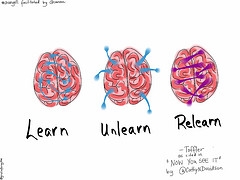The challenge isn’t learning new things. It’s unlearning old ones.
 Change is all but doing something differently, which requires learning something new. No problem, right? Life is learning.
Change is all but doing something differently, which requires learning something new. No problem, right? Life is learning.
But there’s a flip side to change. You have to unlearn something old. You need to stop doing something you’ve learned to do. If you’re not particularly happy with the old way of doing things, unlearning should be a pleasant task. However, if you’re comfortable and skilled in the old way, unlearning it will be a challenge.
Consider this common example.
Let’s say we have a software development team that’s accustomed to receiving lengthy business requirements documents. They study them carefully, prioritize the contents, and lay out game plans for building the systems. Let’s assume that they know many things will change along the way but they like seeing the big picture at the outset. That is, all the major and minor requirements are defined in a single document. When things change (as they always do), the team will re-group and adjust the plan.
When this team begins receiving business requirements in the form of user epics and stories, there will be a bit of culture shock. The big picture will still be there but it will be in the form of epics that progressively drill down into detailed requirements via stories. The epics and stories form a hierarchy that presents the same business requirements in a very different format.
To make things more unnerving, not all of the epics will be decomposed into stories before the team begins to write code — some details will be missing. Having been through this transition several times, I can tell you that some developers and testers will be extremely uncomfortable.
You can train people in a new way of doing something and you have to untrain them in doing something else.
It’s not easy. Be patient. It may not be practical to completely abandon the way things are done today and jump into the new way of doing the same things tomorrow. Going from the current situation to the new one may require intermediate steps. Some people will have trouble letting go, needing time to gradually transition to the new way.
There may be a clash between those ready to leave the past behind and those clinging to it. Keep expectations under control. Move fast but not so fast that some people get left behind and unable to contribute.
photo credit: giulia.forsythe via photopin cc
